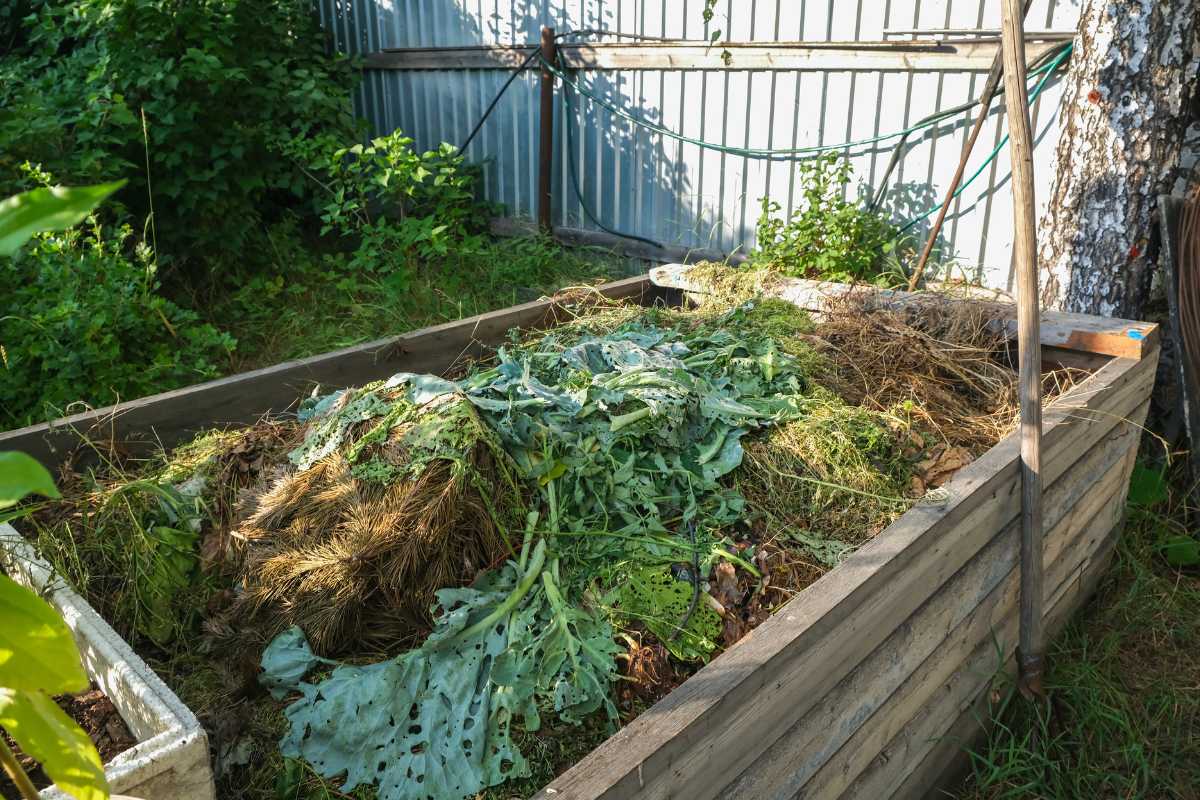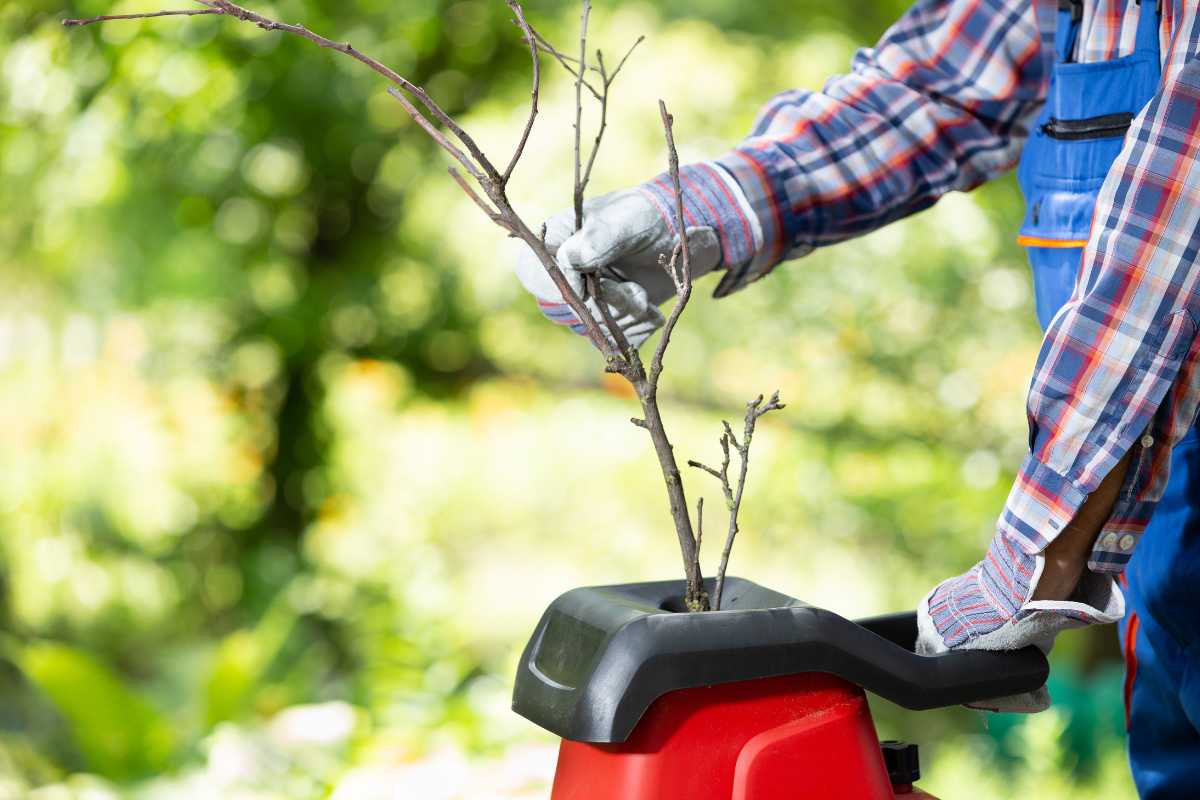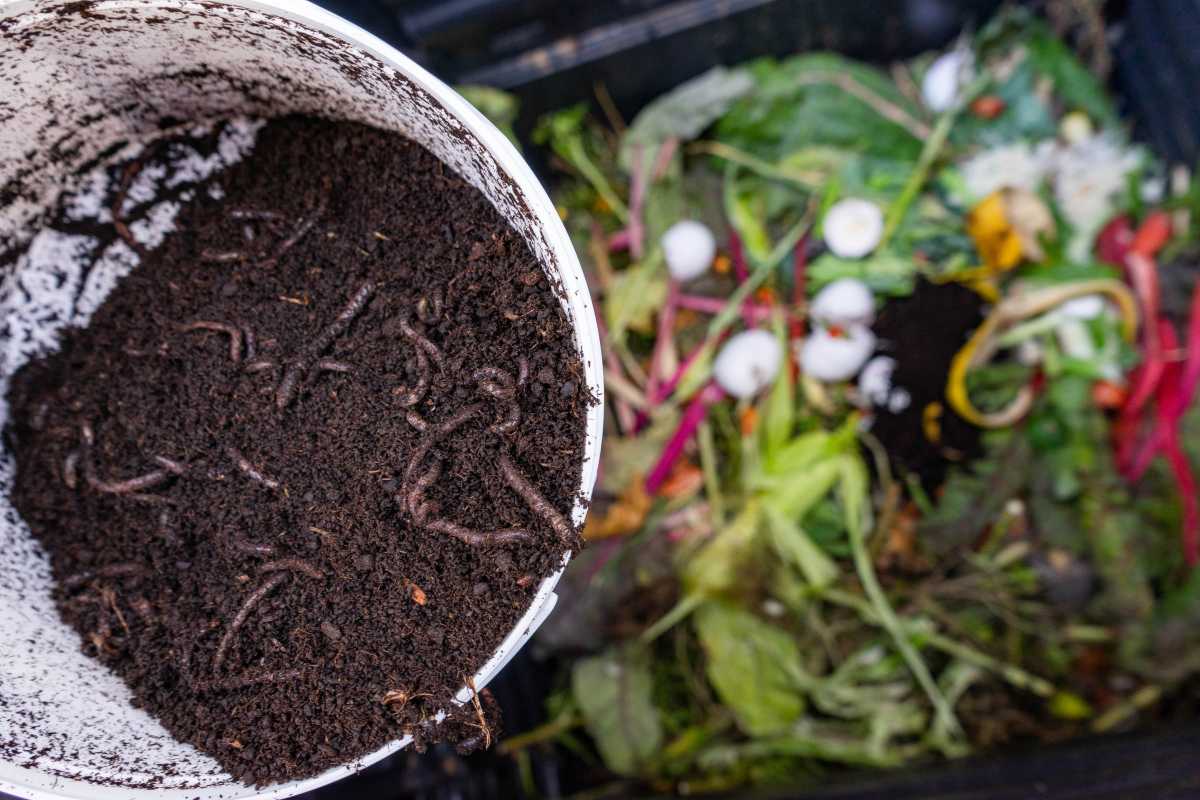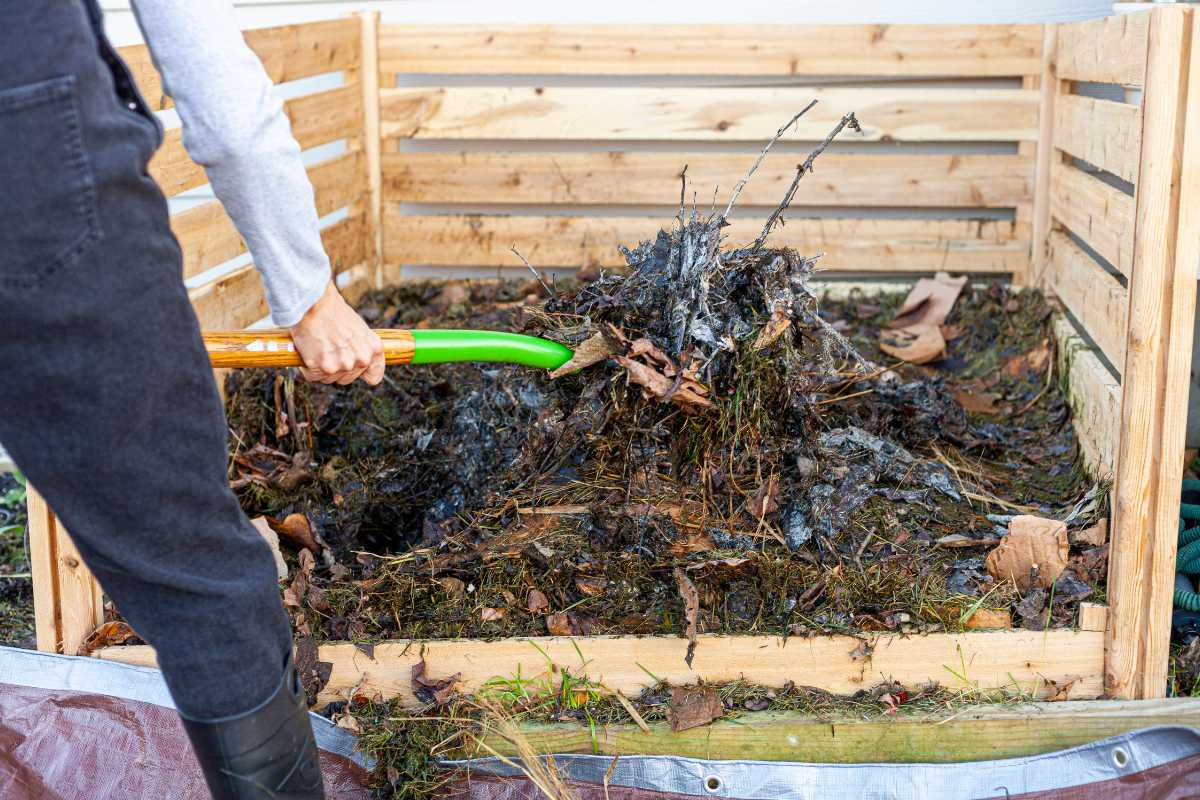You already know what compost is and how it can help your plants and garden. But maybe the starting process takes a long time to get going?
When composting, you need the right combination of green and brown material to make rich earthy compost. However, achieving this balance can be tricky – especially when you first start composting.
The availability of organic materials might make it hard to get your organic matter to start decomposing. You may find yourself still looking at a pile of twigs and leaves months after starting your compost pile.
While there are many things you can do to rectify this, one of them is to purchase a compost starter to give your pile an initial boost to kick off faster decomposition.
What is a Compost Starter?

Composting is a complicated process in which microorganisms and insects aid the breakdown of organic matter to turn it into compost.
When starting out, you may find that you have too much brown material (carbon-rich materials) to start decomposition effectively. Or if you have too much green material (nitrogen-rich materials), and your compost is just a smelly sludge.
Once you have the carbon to nitrogen ratio balance right, insects will be attracted to your compost, and it will develop its own culture of bacteria and beneficial soil microbes that will speed up the composting efforts.
However, if you don’t want to wait, you can buy composter starters. A commercially brought compost starter is also known as an accelerator or compost activator. It’s made up of fungi and beneficial bacteria that speed up the natural decomposition process.
Once the bacteria starts to breed in your composter, nature will do the rest, so you should only need to use a starter once. That being said, you can continue to use a compost starter to shorten the amount of time between adding fresh organic matter and harvesting compost.
Benefits of a Compost Starter
Even if you have a good mix of greens and browns, a compost starter will help improve your compost’s health and the speed of decomposition.
Here is a shortlist of benefits of adding a starter to your newly formed compost pile.
1. Compost Booster
Compost starters will help you create finished compost a lot quicker than waiting for nature to take its course.
2. Healthy Compost Pile
By adding a starter, you will help your compost pile create its own ecosystem. Chances are your pile will eventually attract all the microbes and insects it needs, but a little help goes a long way.
A compost starter will help the biological activity get going.
3. Balances Out the Chemical Composition.
In nature, balance is vital, which is also true of your compost heap. Starters are often equipped to help any chemical imbalance that may be in your pile.
Finding a balance of active ingredients like kitchen waste, garden waste like grass clippings, corn stalks, cardboard, paper, and more is important for microbial activity.
Best Compost Starters
If you are interested in buying a compost starter, here are my top pick of starters available to buy online.
1. Biomaster Compost-It Compost Accelerator/Starter
The Biomaster Compost-It Compost Accelerator is a biological formula that contains over 60 active strains of microbes, which can speed up decomposition and the composting process.
It also boasts the ability to reduce odors, so you can use it in your indoor kitchen scraps bin, and it is also safe for worm farms.
This compost starter is suitable for all types of composters, including compost tumblers. You can use it as a starter or continue to use it as an accelerator as it can turn organic waste into usable compost in just one month.
2. Convino Compost Accelerator/Starter
The Convino Compost Accelerator is designed explicitly for odor reduction, making it perfect to use in your kitchen scraps bin.
You can use it indoors or outdoors in a range of temperatures, and it works on the principle that the faster the decomposition, the fewer smells will be produced.
This starter also contains cedar wood, eucalyptus, and cedar leaf essential oils for a pleasant aroma. This accelerator also contains microorganisms, probiotics, fungi, and wheat bran to help nutrient uptake when adding your finished compost to your garden soil.
3. Dr. Earth Compost Starter
The Dr. Earth Compost Starter consists of a proprietary blend of alfalfa meal, seaweed extract, and microbes to help speed up decomposition. This starter also boasts the ability to create humus and not just finished compost.
Learn more about humus in this article – What is Humus?
This compost starter can be used in all composter types, and you can use it as a starter or an accelerator whenever your green to browns ratio is off.
4. Roebic Bacterial Compost Accelerator.
The Roebic Bacterial Compost Accelerator contains specialized bacteria, which speeds up the breakdown of organic material. The bacteria continue to work under varying temperatures and conditions, so you can turn and aerate your compost pile without worrying about disturbing the bacteria.
It is called a compost accelerator rather than a starter, as it recommends you continue to use this every time you add a fresh layer of organic material. I would say continued use probably isn’t necessary because once the bacteria starts to breed, they should remain in your compost pile.
The Roebic accelerator comes in powder form and is rich in calcium and magnesium. As a fine powder, I recommend using gloves and facemask when applying the accelerator.
Only use it outdoors too. It can be used in a compost tumbler, compost bin, or any other outdoor composter.
5. Bokashi Bran
While the Bokashi Bran Compost Accelerator is designed to be used with the bokashi composting system, you can use this in your regular compost as well.
It’s an organic compost starter that’s made from organic non-GMO wheat bran, containing microbes that help break down organic matter and heat up compost heaps.
It’s also a great bran that will help to make great compost tea.
Tips to Speed Up Compost
You don’t necessarily have to buy a compost starter to start your compost heap. If you don’t want to spend the money on getting your compost going, here are my top tips to help your fresh compost pile along.
1. Get the Balance Right
A good balance of compost materials is the number one rule when it comes to composting. A pile of only leaves and twigs will not decompose, and food scraps alone will form a sludgy, smelly mess.
Make sure that every time you add to your compost, you put in a 50/50 balance of browns and greens. This might not always be practical, as you may have a lot of browns from recent plant prunings or a lot of greens from food waste.
An excellent solution to this is to put your browns on one side of your compost pile, then add a layer of browns whenever you empty your kitchen compost bin.
2. Shred Up Brown Material

Shredding brown material into smaller pieces will speed up decomposition and help your compost to form quickly.
If you add large branches or twigs, the chances are they will still be there in a year, no matter how much green materials you mix with them.
By shredding or chipping larger items, you will be helping your compost’s microbes and insects to break them down.
Check out a couple of these articles to find out more information about cardboard shredding and chipper shredders.
3. Add Worms

If you are just starting to compost, then chances are you haven’t yet attracted a significant amount of worms and other insects to help break down materials. Worms are not just for vermicomposting and worm composters either, traditional compost piles can benefit from worms.
Worms will help process green material and turn it into nutrient-rich worm castings. Worm castings contain beneficial microbes that will also help to speed up the decomposition of your organic materials.
It is important to only choose native worms for this, especially if you have an open-air composter. Some worms are considered to be invasive species. Check out this how to choose worms for composting guide.
4. Water Your Pile
Compost should be damp and moist, but not wet. Adding water is only necessary if you have more brown materials than green. Green materials usually provide enough liquid to keep the heap moist.
If your compost pile looks dry, pour some rainwater on it from a can to help add needed moisture.
5. Turn Your Pile

Turning your compost pile is another crucial step. By turning your pile, you are adding oxygen and mixing up your materials. This aids decomposition and speeds up the process.
Turning your pile shouldn’t be too difficult if you have a good balance of well-shredded materials. Use a fork rather than a spade or shovel to add more air and give it a good stir.
Compost Starters Final Thoughts
All in all, compost starters are a great way to get started with composting. They’re easy to get and don’t require any special equipment. Getting the right balance of brown and greens can be difficult when starting out, so a natural compost starter will be helpful.
Check out some of these other articles on composting to learn more:
Compost Starters FAQs
Do You Need A Compost Starter?
You do not technically need a compost starter as long as you have a good balance of browns and greens in your compost. However, it can be hard to have a well-balanced compost pile and a compost starter will help the decomposition process get moving. A compost starter/accelerator can also help whenever you add large amounts of fresh material. It can help keep the compost activity moving.
What Is a Compost Starter Made Of?
Compost starters are made of beneficial bacteria and fungi that will speed up the decomposition process of compost materials. Compost starters will have millions of microbes and pH balancers to help with kick start the bacterial activity to break down the garden and kitchen waste.
What can be used as compost starter?
Using things around the home and garden can be mixed together to use as a compost starter. Use nitrogen-rich materials like grass clippings, food scraps, fresh garden prunings, and seaweed. You can also purchase a compost starter online at sites like Amazon if you don’t have the materials at home.
What are the best compost activators?
There are many good compost activators like the Biomaster Compost-It and Jobe’s Organics Compost Starters. Look at the ingredients that make up the compost activator and the microorganisms that are included, whether it’s bacteria or fungi.
Does compost starter really work?
Yes, a compost starter does really work. Compost starters already contain the active ingredients of a healthy compost pile and the beneficial bacteria that breaks down the organic materials. Getting to the same point from a fresh compost pile can take a few months if not well-balanced with greens and browns, but a compost starter will move things in less than a month.
What is a natural compost starter?
A natural compost starter is one consisting of organic compost materials and no harmful chemicals. A good natural compost activator should have a healthy balance of carbon, nitrogen, and microorganisms like bacteria and fungi.
Why is urine good for compost?
Urine is good for compost because it’s very nitrogen-rich, so it will count as green material. If you have a wet compost pile and rich in nitrogen materials already, like food waste, don’t add urine. If you have a carbon-rich compost pile, then adding urine can help balance your compost.






